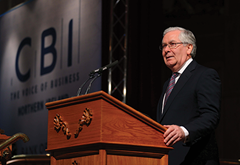Banking confidence needed for more recovery: Mervyn King
 Part-nationalised banks could return to the private sector by raising extra capital and re-structuring their businesses, according to Bank of England Governor Sir Mervyn King.
Part-nationalised banks could return to the private sector by raising extra capital and re-structuring their businesses, according to Bank of England Governor Sir Mervyn King.
The outgoing Governor of the Bank of England, Sir Mervyn King, has said that restoring confidence in banking is a key factor for aiding the UK’s “gentle recovery” from the financial crisis. King was the keynote speaker at the CBI’s mid-winter dinner in Belfast.
As he has done previously, Sir Mervyn used medical analogies to describe the state of the UK economy: diagnosis, prescription and prognosis.
“At one level, the diagnosis is self-evident,” he commented. “Growth has been much weaker than most commentators expected.” This reflected “the inevitable correction of exuberance on the part of borrowers and lenders” and also the need for the British economy to rebalance as it recovers.
A “deep and protracted squeeze” on average take-home pay meant that it was “no higher than back in 2004” and this made the retail recovery “unusually weak”.
The balance sheets of major UK banks, financed primarily by borrowing, had grown considerably before the crisis hit. The reduction in bank lending was therefore greater in the UK than elsewhere.
In the euro area, the near-term outlook was bleak and the longer term prospects for “tackling the evident fault lines in the monetary union” were uncertain. He added: “The former means that our current account deficit has remained stubbornly high, and the latter is holding back corporate investment.”
As for prescription, the bank had kept interest rates at all-time lows, intervened with quantitative easing and introduced the Funding for Lending scheme, in conjunction with the Treasury. Monetary stimulus, though, could not restore the economy on its own.
Banks were now “overflowing with liquidity” but needed to do more to convince the investors that they were a safe investment over the long term. Raising extra capital or re-structuring their businesses and exposures could help part-nationalised banks to return to the private sector “within a relatively short period.”
Action by the European Central Bank had brought “a period of calm” to the financial markets but only politicians could produce lasting solutions to the euro zone’s problems.
Sir Mervyn was speaking before the release of GDP figures for Q4 2012, which showed a reduction of 0.3 per cent. He cautioned that quarter-to-quarter changes say little about the “underlying strength” of the economy as they are affected by one-off factors.
Inflation was due to remain above target for much of 2013. Regulated prices (including energy bills and tuition fees) will put an “unusually strong” upward pressure on inflation as they were outside the market and therefore less susceptible to monetary policy.
“There are good reasons to suppose that a gentle recovery is underway,” he added. Broad money growth is rising, credit conditions have improved, mortgage rates have fallen and large companies had large holdings of cash and ready access to capital markets.
He also defended the bank’s inflation target of 2 per cent as increasing interest rates to limit price rises would, in his view, have deepened the recession and also increased unemployment.
Concluding, he remarked: “Patience and a sense of realism are sometimes mistaken for fatalism. Our economy is recovering, more slowly than we might wish, but we are moving in the right direction.”
In what was his final regional visit as Governor, Sir Mervyn paid tribute to the business community as “the agent of change and reconciliation” and mentioned how he appreciated the “extraordinary beauty” of Northern Ireland. He looked forward to returning in a private capacity in future.
The full speech is available at www.cbi.org.uk/ni





